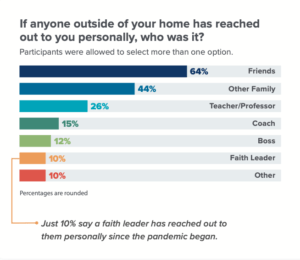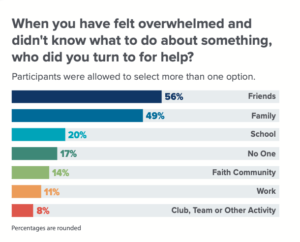The faith of young people in the United States has remained stable despite the challenges of a pandemic that often prevented in-person fellowship and undermined trust in religious institutions, a new study says.
“A plurality of young people say their faith remained steady during the pandemic (47%). While 27% say they are doubting their faith more or lost their faith completely, nearly the same percentage (26%) say their faith has gotten stronger during the pandemic,” Springtide Research Institute said in its report titled “The New Normal: 8 Ways to Care for Gen Z in a Post Pandemic World.”
The survey, which was conducted in February, asked 2,500 respondents ages 13 to 25 to share how they navigated the coronavirus outbreak and how the experience affected their attitudes toward technology, government and church.

Kassidy Hall
For Kassidy Hall, a 22-year-old senior at Taylor University in Indiana, the pandemic revealed a disturbing side of church when health precautions were rejected.
“On a national scale, we saw the true color of leadership with decisions around COVID mask wearing,” Hall said, adding that it was a turnoff to many in her generation to see health guidelines ignored. “I know that church attendance went down, and I can see that people will be less likely to return after things open.”
Many also have been shaken by the widespread human suffering that occurred during the pandemic. “With hundreds of thousands of people dying, a lot of people are asking, ‘Where is God?’ And I have explored that question, but it hasn’t led me to doubt there is a God.”
The Springtide survey also found that houses of worship could have done much better helping younger people feel connected.
“A perplexing proportion of young people (42%) say no one outside their home has reached out to see if they are all right, leaving nearly half feeling isolated (47%) and without anyone to talk to about how they are feeling or what they are going through (47%).”
 Almost 45% of respondents said that other family had reached out to them personally in the preceding year. Another 26% said a teacher or principal had checked on them, followed by coaches and employers, at 15% and 12%, respectively. “Just 10% say a faith leader has reached out to them personally since the pandemic began.”
Almost 45% of respondents said that other family had reached out to them personally in the preceding year. Another 26% said a teacher or principal had checked on them, followed by coaches and employers, at 15% and 12%, respectively. “Just 10% say a faith leader has reached out to them personally since the pandemic began.”
Feeling isolated from communities of faith was initially intense, said Amar Peterman, a master of divinity student at Princeton Theological Seminary.
“The pandemic has certainly exacerbated a sense of loneliness,” said Peterman, 24. “For young people, especially, it became a turning point where they could not attend church for the spiritual nourishment they needed.”
But Peterman, who also serves as director of the Center for Empathy in Christian and Public Life, said he and other seminarians recognized the deficiency and acted as quickly and safely as possible to establish outdoor gatherings among themselves.

Amar Peterman
“That initial sense of loneliness was met by a desire to really dig into the relational nature of the Christian faith in a way that’s even stronger for me now than before the pandemic,” he said.
The survey, however, found that close to one in five respondents have ceased attending in-person religious gatherings during the pandemic, and 20% said “they were happy that this connection was lost.”
A majority (65%) of Gen Z respondents said they feel the government did a poor job trying to protect them during the outbreak, an attitude that spilled over toward churches. “It appears young people also lack confidence that religious institutions can keep them safe,” the study’s authors wrote.
Although 50% credited faith communities with doing a “a great job navigating the pandemic,” Springtide suggested that attitude may result more from the availability of virtual services than from confidence in physical safety at church.
Participating in online offerings has done little to end the isolation many young people continue to feel: “Though nearly half of young people say they watched at least one religious/spiritual service online (44%), very few young people say they found joy (13%) or hope (14%) in these services. Just 12% say they hope virtual services continue after the pandemic.”
 In part this speaks to the limits of technology, the survey report said. “Though Gen Zers have been called digital natives, 40% disagree that connecting with people, even virtually, makes them feel better. Just 29% say that virtual school is a practice they would want to keep. The majority (66%) agree that ‘for the most part, I won’t take for granted relationships and opportunities the way I did before.’”
In part this speaks to the limits of technology, the survey report said. “Though Gen Zers have been called digital natives, 40% disagree that connecting with people, even virtually, makes them feel better. Just 29% say that virtual school is a practice they would want to keep. The majority (66%) agree that ‘for the most part, I won’t take for granted relationships and opportunities the way I did before.’”
The survey also uncovered psychological impacts from the profound separation young people have experienced in the pandemic. More than half said they feel heightened anxiety and discomfort from the uncertainty about their lives going forward.
Springtide concluded that trustworthy and understanding adults are what Gen Z wants and needs to adjust.
“Notably, just 14% say they have turned to their faith community when feeling overwhelmed and unsure of what to do, while just 18% say they connected with their faith community to help them cope during a challenging or difficult time,” according to the survey. “Faith leaders in particular have an opportunity in the coming months to show young people that they care.”
Related articles:
3 current trends youth leaders need to know
8 topics that ought to be on every youth minister’s agenda
Young adults say churches key in battle against climate change, poverty and corruption


